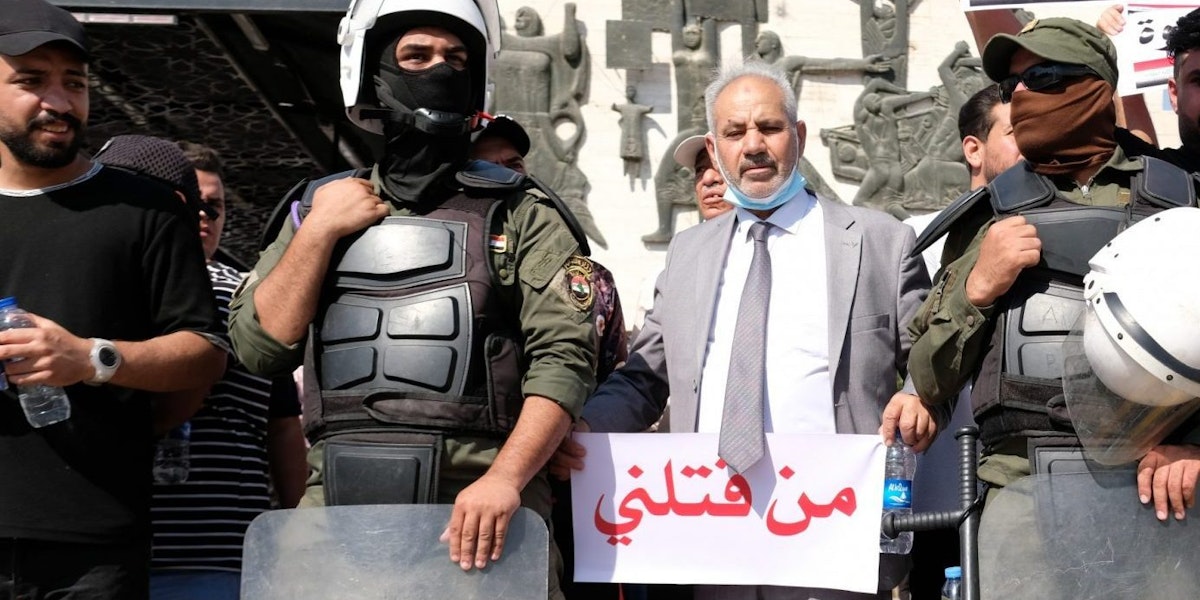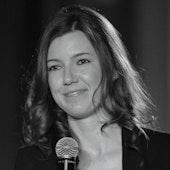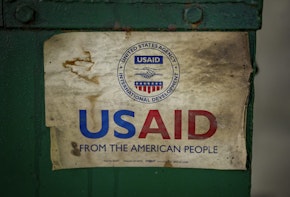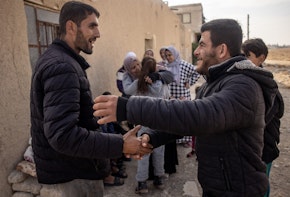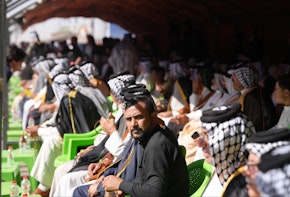Most analysis of the ongoing Iraqi government formation crisis focuses on the role of the dominant Shia Islamist factions competing for preeminence in the Iraqi state: the Sadrists and the Coordination Framework.1 But such analyses often neglect to examine the way that a growing number of groups not aligned with the status quo view the crisis. In Iraq, these groups include independent politicians, emerging political parties, and activists. This report seeks to fill this gap by highlighting the attempts of various political actors to forge a “third way.” I call these political actors “change politicians,” and they include change-oriented independent politicians and emerging political parties whose primary objective is disruption of the status quo through the current political system, as well as activists working outside the system. Further, the report examines obstacles these groups face within the broader political system.
October marks three years since the seminal Tishreen protests of 2019, which toppled one government and brought in Iraq’s first sizable bloc of nonaligned members of parliament. Demonstrators wanted basic political and economic reforms, including jobs for youth. Once the state responded with violence to these peaceful demonstrations, the Tishreenis escalated their demands, calling for an overhaul of the political system. They also demanded accountability and consequences for the unidentified security personnel who killed at least six hundred demonstrators.2 But most demands of the 2019 protests have not been met, raising the prospect of a return to the streets by Iraqis who have found few political channels for their aspirations and grievances.
This report shows that change politicians, as well as Tishreen activists, are using the crisis to highlight the failure of the dominant political parties to address Iraqis’ needs, while presenting themselves as a third way—different from both the Sadrists and from the Sadrists’ rivals, the Coordination Framework. (The latter two alliances are at odds in the government formation crisis.) The change politicians and activists articulate a different approach to power in Iraq, removed from the corruption that is hollowing out the political system. Through protests, media statements, and playing the role of opposition within parliament, they are hoping to press for reform.
Interviews suggest that while change politicians are still a long way from holding power, they are engaged in mostly genuine attempts to build a politics separate from the status quo scramble for shares of state resources. However, while change politicians made an impressive first showing in the 2021 parliamentary elections, infighting and divisions have since slowed their progress, as have allegations of corruption, misadministration, and leadership disputes, among other issues.3 The political crisis and prospects of early elections are now pushing change politicians to reexamine their movement and their strategies.
The biggest challenge, however, remains the dominant elite, many of whom appear willing to use any force at their disposal—whether legal, illegal, or violent—to maintain their positions of power. Change politicians’ strategy of staying out of the government formation charade—along with the fact that they command little tangible power—means that they have played almost no role in the ongoing political crisis. Change politicians might at some future moment play a more direct role in Iraqi power and politics, but for the time being they are a nascent phenomenon.
Many of the dominant elite appear willing to use any force at their disposal—whether legal, illegal, or violent—to maintain their positions of power.
Since August, I have conducted dozens of interviews inside Iraq with political party members, party supporters, activists, and others from across the political spectrum to better understand each side’s positioning and outlook on the crisis. For this report in particular, I conducted more than a dozen interviews with independent members of parliament, emerging political party members, and protesters and activists calling for change and denouncing the system dominated by the political elite. Most interviews were conducted in Arabic in Baghdad, with follow-up interviews conducted over the phone. I also attended protests led by emerging parties in Baghdad in August. Many individuals spoke on condition of anonymity due to the sensitivity of such issues, and are identified by their affiliation.
The Government Formation Crisis
Nearly a year after Iraq’s October 2021 parliamentary elections, the government has yet to be formed. The government formation power struggle pits the Sadrist Movement, led by populist Shia cleric Muqtada al-Sadr, against the Coordination Framework, a loose grouping of Shia parties, united mostly by their opposition to Sadr.4 At its core, the crisis of elite political consensus and government formation is a showdown between Sadr and the Coordination Framework—it is a dark tale of political rivalries, personal feuds, and competition over government postings—not differing approaches to policy making.5 Their dispute is closely entangled with Iraq’s muhassasa, an informal ethno-sectarian apportionment system, which is key to maintaining patronage networks within the Iraqi political system.6 While prolonged government formation negotiations are the norm in Iraq, this recent period marks the longest impasse since the 2003 U.S.-led invasion reset the country’s political order.
After the Sadrist Movement won seventy-three seats in the October 2021 election—the best showing of any faction—Sadr eschewed the customary practice of forming a consensus government among dominant political parties (a practices known as “tawafuq” in Arabic) and instead sought to form a “national majority government” with the allies of the now defunct tripartite alliance, the Kurdistan Democratic Party, and the Sunni Sovereignty Alliance. The opposing camp consists of the Coordination Framework and their allies.
But Sadr’s attempts to form a national majority government were stifled on multiple occasions, most notably by the Federal Supreme Court’s quorum ruling in February 2022, which held that a two-thirds parliamentary majority was needed to elect a president.7 By June, Sadr had apparently had enough—to everyone’s surprise, he instructed his members of parliament to resign.8 Sadr’s supporters staged a nearly month-long sit-in.9 The sit-in only ended after a series of escalating confrontations that ended in violence: On August 29, Sadrist supporters stormed the presidential building in Baghdad’s secured Green Zone; groups allegedly aligned with the Coordination Framework later fired on protesters; and then clashed with Saraya al-Salam—the “Peace Brigades,” the Sadrist Movement’s armed wing—leaving more than thirty people dead and many more wounded. The next day, Sadr announced his “resignation” from politics.10 Religious holidays forced political downtime until September 17. But negotiations have since resumed. Despite ongoing dialogue (which the Sadrists, thus far, have declined to join), deadlock continues, and many Iraqis fear future violence unless both camps can reach mutually acceptable concessions.11
Most analysis of the government formation crisis has focused on the role of the Sadrists and the Coordination Framework. But such analyses often neglect the perspective of independent change politicians, emerging political parties, and Tishreen protesters and activists. As noted, this report seeks to fill this gap. Iraq’s future depends on numerous moving parts, and the stakes are dire. Disillusionment with dominant political elites is at an all-time high, but the groups seeking change continue to face many challenges—both internal conflict and pushback from the ruling elite.
Evolution of a Political Third Way
The ongoing government formation crisis is a power struggle between dominant Shia political parties and specific political personalities. But it affects the entire political system and the Iraqi people more generally. Change politicians and activists are utilizing the crisis to highlight differences between them and the ruling elite. During interviewees with their representatives, they described themselves as a “third way”—an alternative to the two dominant poles of the Sadrists and the Coordination Framework—which rejects political violence, the muhassasa, and corruption. Details varied but, in general, most interviewees said they strive for “genuine reform” of the political system and advancing ideals of a civil, liberal state, and a reconceptualization of Iraqi identity and the relationship between the state and its citizens. When asked about the differences between them and the dominant political elites, one emerging party member responded, “They’re not political parties, they’re political militias.”12
The Tishreen movement emerged in 2019 as a leaderless, youth-driven grassroots movement.13 While protests had happened before—with notable peaks in 2012 and 2015—none since the U.S.-led invasion of 2003 were as large as the protests of 2019. The Tishreen movement is essential to understanding the rise of reform-oriented political parties, independents, and protesters that are active today.
In October 2019, civil society organizations, student unions, older civic-minded parties, longtime activists (including, at times, the Sadrists), and others joined the majority young, politically nonaligned activists in the streets.14 What began as a call for reforms evolved into demands to overhaul the political system. Iraqis had had enough of elite consensus politics in which corruption thrived. Tishreen succeeded in unseating the government and pushing parliament to adopt a new electoral law. The protests wound down in 2020, due to violent repression, the onset of COVID-19, and various other domestic and international factors.15 But the sentiment behind them remains alive and well, even as the movement has transformed.
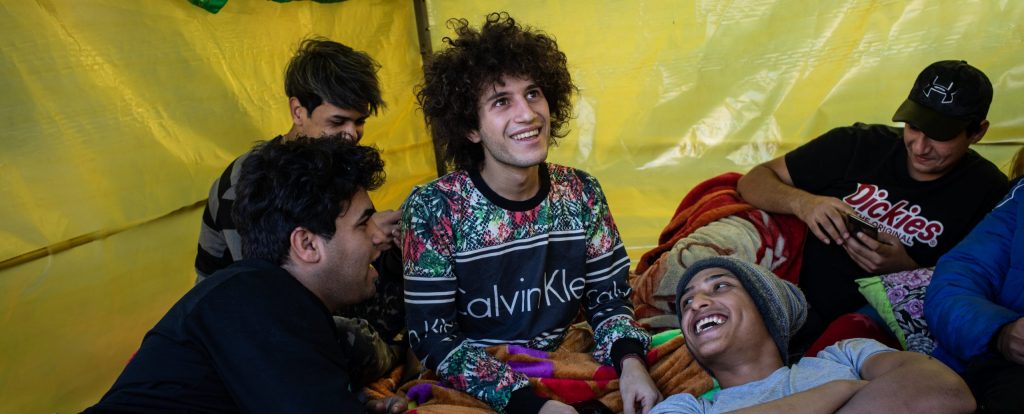
The Tishreen movement emerged as a pure expression of rage at status quo politics. In the protests, one longtime activist said, the “action preceded the theory.”16 There was no clear set of demands or values that bound them all together in the beginning. And as protests faded and early elections were planned, people began to drift off into smaller groups.
Some activists sought to harness the political energy of protests to transition from protesting to political organizing. Highly skeptical of the post-2003 political order, they decided that peaceful reform from within was nonetheless the best way forward. Thus, many activists who were once prominent in the Tishreen movement now lead or have joined emerging parties established during the Tishreen protests and leading up to the 2021 parliamentary elections.
The Tishreen movement emerged as a pure expression of rage at status quo politics.
Others decided not to join an emerging political party, and instead supported or ran as “independents” in the elections. In basic terms, independents are politicians who are not official members of a political party. But in reality, independents in Iraq exist along a broad spectrum and may be classified into three different subcategories, defined loosely as follows: The first group might be described as “partisan independents”—those who have partisan inclinations but are not formally members of a political party.17 (The extent of their partisanship varies.) The second group might be called “local leader independents,” who lead or have strong ties to local establishment interests, such as tribes, businesses, and religious institutions. The third category might be called “change independents,” who claim to push for democratic reform of the post-2003 political system. Change independents’ numbers are limited in the current Iraqi political context. Most independents in Iraq are partisan or local leaders. This is an important distinction, because when people refer to themselves as independents it should not automatically be assumed that they are advocating for change.
Change activists (a term I use to refer to both change independents and emerging parties) exceeded expectations, especially in Shia majority areas, winning dozens of seats in parliament. Several prominent emerging parties, such as al-Beit al-Watani (the National Home) and others boycotted the elections, citing high levels of violence and intimidation against their members and supporters.18 Other emerging parties, such as Emtidad, participated in the elections and secured seats in the double digits.19 Emtidad subsequently joined forces with the New Generation Movement (a party based in Sulaimani in Iraq’s mostly Kurdish north) to form the Alliance for the People, a parliamentary alliance.20 The fact that a number of change politicians did well, despite violence and low turnout, is a testament to Iraqi voters’ appetite for change and the fortitude of change politicians’ organizing and campaigning on limited budgets.
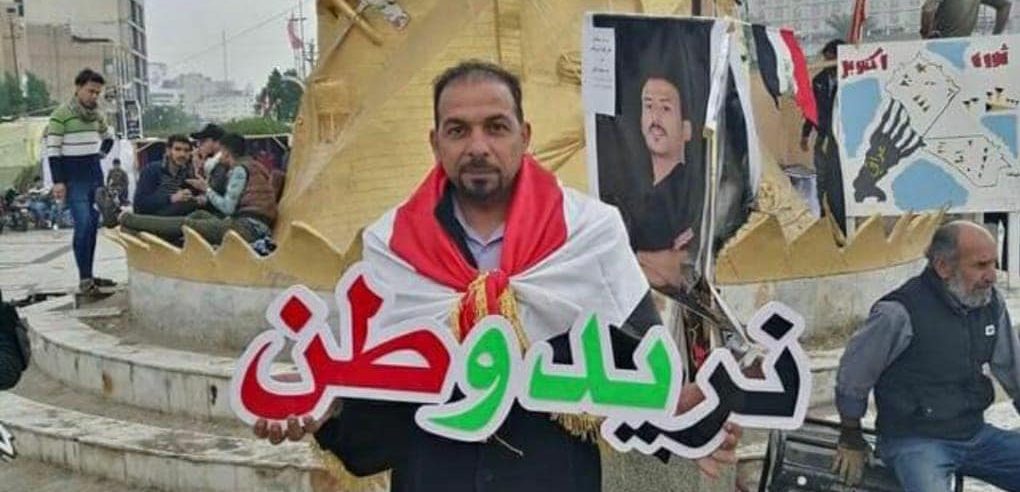
Most prominent Tishreen activists who continue their activism evolved by either joining emerging parties or ran as or supported change independents to advocate for democratic change. However, some prominent protest activists prefer to remain in opposition, outside of parliament—some espouse a more radical approach to change, while others see protests as a more effective tool for political pressure.21 Key examples of this are the Central Committee for Demonstrations and notable protesters, such as activist Durgham Majid, a veterinarian from Hilla.22 Some joined the more “reform-minded parties” of the traditional political actors. Others were co-opted by dominant political parties.
Not all Tishreenis have continued their activism. Some were assassinated or seriously injured. Others were displaced or fled the country due to threats, or withdrew from activities due to family, health, work, security, or other concerns. Security remains a top concern for most people publicly critical of or working to reform the system.
During separate interviews, change politicians and activists shared how they are positioning themselves and messaging during the ongoing political crisis and what this means for their future.
Responding to the Crisis
Four common themes emerged from my interviews with change politicians and activists about how they are responding to the elite political crisis. First, they are publicly highlighting how dominant political parties continue to fail the Iraqi people while investing all their energy into government formation disputes. Second, they are contrasting elites’ political protests with their grassroots, spontaneous protests, which enjoyed popular support. Third, they are pursuing the strategy of monitoring and opposition within parliament, combined with protests outside the government. And fourth, change politicians are using Iraq’s political crisis to reexamine their movement and strategies moving forward.
The Coordination Framework and Sadrist tit for tat has made it easy for the change independents to pursue their first strategy of highlighting dominant parties’ failures. Using media interviews, press conferences, statements, and organizing protests, the change politicians and activists juxtaposed the Sadrist and Coordination Framework camps’ fixation on their political battles with the two camps’ apparent disinterest in improving governance. Most Iraqis reject political violence and want stability in their everyday lives. Many change politicians also distinguished between political elites and their supporters. Perhaps not surprisingly, change independents said they would be happy to have the support of those parties’ supporters.
One change politician member of parliament said that his role in the political crisis was “to stay far away from it.”23
“This is a political power struggle, and we are not a part of it. We are a third way,” said Anwer Aziz, a member of the political office of emerging party Emtidad.24
“Iraq has had a history of bloody coups throughout the twentieth century,” said a member of the political office of the Social Democratic Current (SDC), another emerging political party. “We have had enough of that. Now the focus is on a democratic struggle.”25
“The conflict between Sadr and [Nouri al-] Maliki doesn’t interest us because we have a different point of view,” one emerging party member said. “We want responses to our demands for reforms.”26
“Neither the Sadrists nor the Coordination Framework represents our demands,” said Hussein al-Guorabi, general secretary of emerging party al-Beit al-Watani. “They are based on religious sectarianism. We are the alternative.”27
Others contrasted specific aspects of their party’s organization with some dominant parties. “Our party leadership is elected and makes decisions,” one change politician said. “We aren’t a one-man cult party.”28
Grassroots Bona Fides
The second theme of interviews was change politicians’ contrasting of “political protests”—led by parties within the Coordination Framework or the Sadrists—to the protests of Tishreen, which were initially spontaneous and grassroots, and enjoyed more support among the Iraqi people.
Some change politicians and activists, who asked not to be quoted by name, acknowledged that there were some internal discussions on how they could potentially ride Sadr’s “Ashura Revolution wave” (which began in August) to the benefit of their cause, but most concluded that this would ultimately not serve their aims.
“Sadr’s words received wide acceptance with his initial tweets, but ultimately there is a lack of confidence between Sadr and the people,” said Sajad Salam, a change independent member of parliament from Wasit governorate who was close to the protest movements. “Sadr thinks Tishreen is a decoration, something to control. But Tishreen’s mood is hard to control,” he said.29
“Sadr is not a partner who can be trusted,” a political activist said. “Tishreen doesn’t act on command from Sadr…the movement is about change.”30
Interviewees recalled the Sadrists’ complicity in threatening or killing protesters and activists in Tishreen, actions that reportedly took place during and after the Sadrists’ withdrawal from the protests in January 2020.31 Many also mentioned the storming of al-Haboubi Square in Dhi Qar governorate in November 2020 by the Sadr’s supporters, which resulted in the killing of Tishreen protesters.32
“Tishreen doesn’t act on command from Sadr,” a political activist said. “The movement is about change.”
There were other reasons for mistrust. “Sadr has no intention of giving any Tishreenis leadership positions or to work with them,” one member of an emerging party said, pointing to the 2018 parliamentary elections, when the Communist Party and others allied with the Sadrists. “Look what happened to the Communist Party in 2018—did that translate into any gains for them? No…. Instead, Sadr should be asking himself what concessions he should give to us, not the other way around.”33
Activists said that all these issues contributed to Sadr’s failure to expand much beyond his base in the most recent protests.
For the dominant elite parties, “democracy is clothes, not a way of life,” an SDC political office member said. “The real struggle is a societal struggle between the ruling entities and the Iraqi people.”34
Some Tishreenis were present at “Ashura Revolution” protests in August. But most people I spoke with said those individuals participated in their personal capacities and not as representatives of their parties, and that their numbers remained limited.35
Moreover, asking if Tishreen supports Sadr’s demands for reform or not is an imprecise question at best. “Tishreen is not an institution, it’s an idea, a movement” said Muhe al-Ansari, head of al-Beit al-Iraqi (the Iraqi House), another emerging party.36
Strategic Political Engagement
The third theme in interviews with change politicians was their development of strategies to advance their agendas during and after the current crisis. Those with presence inside parliament saw their function as monitoring and opposition within the legislature. There is no tradition of opposition politics in Iraq—many dominant blocs see government participation as a way to access spoils, and being in opposition does not further this goal. Change politicians with presence in parliament are therefore trying to go against this trend. “Opposition members of parliament may not be influential over the political government formation equation, per se,” said one member of an emerging party. “But their presence is important and necessary because they send a message to the dominant political parties that they do not have a monopoly on parliament, and parliament is not just for them. They also serve to represent the interests of some societal groups and some demonstrators in parliament.”37
For example, ensuring potential changes to the electoral law before the next election (whenever it may be) furthers the goals of an inclusive democracy and of not only favoring dominant political blocs. Sajad Salam, a change independent member of parliament, noted the importance of activating the parties’ law and keeping electronic vote-counting machines, which some dominant parties have advocated against in the past.38 “We should be moving forward, not backward,” he said, criticizing attempts to cancel electronic vote-counting machines.39 Salam was one of the independent members of parliament who signed a statement released on August 2 calling for comprehensive national dialogue which, according to the statement, should differ from past dialogues and include all political and societal forces.40
According to Aziz, the Emtidad member, the medium-term goals of the party are amendments to constitutional articles that are vague and have more than one interpretation; addressing matters that have exceeded their constitutional time period, stalling appointments; and passing laws.41 Emtidad’s longer-term goals are for the revision of the 2005 constitution, with the participation of the Iraqi people.
Smaller parties and independents have to coordinate, to a certain extent, with whomever is in power. “But dominant political parties do need independents to get some things done and we can use this for leverage,” one member of parliament from Baghdad said.42
The role of emerging parties without representation inside the current parliament “is to continue to put pressure through the media, street activism, and other forums to get the government to address this crisis,” said Khalid Waleed, the media spokesperson for the emerging party Nazil Akith Haqi Democratic Movement. “We will also continue to prepare for elections and show ourselves to be a third way.”43
On August 2, the “forces of democratic change”—an initiative gathering change politicians and activists (as well as the Communist Party)—released a statement criticizing the dominant political blocs for not addressing the political crisis.44 The statement said that signatories rejected any conflicts that did not serve the Iraqi people and their aspirations. The group confirmed its support for comprehensive political change through peaceful means to build a civil democratic state based on citizenship and social justice. On August 12, the signatories organized protests in Fardous Square in Baghdad and released a second statement.45 On September 23, a third statement was released following a meeting in Nasiriyah which was also attended by trade unions and other groups.46 Among other things, the statement said the meeting was the first in a series of several gatherings toward advancing economic, political, and social alternatives to address Iraq’s crisis. The statement expressed support for the upcoming protests on October 1.
Activists with no direct participation in formal politics have also been taking advantage of the crisis to organize. In response to a call by the Central Committee for Demonstrations to organize their own separate demonstrations, hundreds of demonstrators gathered on August 5 in Nisour Square in Baghdad to call for a complete change of the current political system.47 Again on September 2, Tishreen protesters took to the streets in Baghdad to call for change of the political system; they also outlined reforms, and rejected the corrupt political classes.48 These protests were initiated by activists outside of formal politics, but many emerging political parties and change independents publicly expressed support for them. More protests are planned for October 1—the anniversary of the original Tishreen protests—and some emerging parties have already pledged support for them.49
Learn More About Century International
The Future of the Third Way
The fourth theme in interviews was the question of the change politicians’ and activists’ “third way”: What does it mean, aside from being different from the Coordination Framework and Sadrist Movement? How has the meaning of Tishreen evolved?
One change politician said that now was the time for change politicians to learn from past mistakes and build critical infrastructure. Change politicians should use the political crisis, which has deepened Iraqis’ disillusionment with the political elite, to make inroads with new members, supporters, and stronger alliances, he said, adding that emerging political parties need to solidify their positions on political, economic, religious, and other issues, and expand their support base. They then should find common ground with similarly minded groups and political parties and focus on pushing those points forward together. “If we work together, it will be harder for them to eliminate us,” he said.50
Other interviewees said that a few of the emerging political parties have been partly co-opted by traditional political elites, and that trust remains an issue for coordination between some groups. “Just follow the money,” one political activist said, noting that funding inevitably drives some groups’ agendas.51
Some emerging parties have faced media criticism in the past few months over announcements of resignations, accusations of corruption, mismanagement, and other internal political party disputes that have spilled out into the public eye—in addition to tense relations with other emerging parties.52
While acknowledging mistakes and the necessity of going through a period of “healthy correction,” one change politician pushed back on these criticisms. “Factions within the Coordination Framework and the Sadrists are shooting each other in Baghdad and assassinating each other in the south,” he said in an interview. “We don’t have militias. We aren’t killing anyone or rival political groups. Let’s keep our criticisms in perspective here.”53
“We don’t have militias,” said one change politician. “We aren’t killing anyone or rival political groups. Let’s keep our criticisms in perspective here.”
National dialogue discussing the government formation deadlock is underway. But participants are mostly confined to dominant political blocs and change politicians with presence in parliament remain on the periphery.54 Presenting themselves as a third way, and outside of personality politics and muhassasa negotiations, they remain removed from the central concerns of power and have no ability to force political agreements.
Majid Durgham, the prominent Tishreen protest organizer and activist from Hilla, said that activists reject everything that has been done to Iraq since the U.S.-led invasion in 2003, by foreign nations and by Iraq’s dominant ruling parties.55 Tishreen protesters “regret the United States and Iran’s role in protecting these parties,” he said. Tishreenis will continue protesting to “rebuild our nation… [ruling parties] have not done anything but kill and steal… they have not built anything for us.” Iraqi elections are conducted in an environment where the ruling dominant elite are armed and can threaten others to gain and maintain power; Durgham said he did not think that elections have brought a “good result” for Iraqis. “We want fundamental change and have more organized leadership now,” he said. “We will bring our voices out.”56
An Unsettling Political Education
Even if internal party housekeeping and coordination between emerging parties and change independents is achieved, does the crisis of elite political consensus expose the limits of change politicians’ attempts to blaze their own path? While some change politicians were able to successfully mobilize to get seats, once in parliament, how much can they affect the course of events? For many, this is their first time in parliament and the political learning curve is high. But would more experience really translate into greater efficacy in a system that favors the dominant political elite and seeks to crush its opponents?
Several members of parliament separately commented that their experience in parliament revealed how lawmakers often have no tools of implementation. “Nothing is applied,” one member of parliament said. “There are lots of violations of the law, no one shows up, even when they need to make decisions, and no one is held to account.”57
Early elections, even if they happen, will need more than a year to be planned and executed. Some lawmakers lamented that their time in parliament thus far has been marred by elites’ fighting over government formation, and they don’t have much to show for their efforts, even if it’s not necessarily their fault. Moreover, a shortened campaigning period would disadvantage emerging parties and change independent candidates with less experience and more limited resources.
But such complaints were not limited to change politicians. Even well-resourced lawmakers from established parties are tiring of the political games. One first-time member of parliament from a major Sunni party lamented the prospect of doing an election all over again. “I’m tired,” she said. “Running for office is exhausting. And now we may have to do it again? What do I tell my constituents? We couldn’t achieve anything because we never formed a government but vote for me again? What is that?”58
Protesters are likely to take to the streets again on October 1 to commemorate the third anniversary of the Tishreen protests. The potential participation of Sadrists, whether informally or informally, remains an important issue.59 While many change politicians and activists seem to reject the option of formal coordination with the Sadrists, not all do; in any case, it is not clear if Sadrists will participate in the protests, or how.
Other concerns cloud the anniversary commemoration: earlier this month, Popular Mobilization Units members arrested activists, accusing them of belonging to the Ba’ath party and plotting attacks. Activists from Karabala, Babil, Muthana, and Diwaniya governorates were arrested—one of whom later died, allegedly under torture.60 Activists worry that this could be an early warning message to organizers in southern Iraq ahead of October 1 protests.
One of the biggest outstanding questions is whether change politicians’ “third way” can be more clearly articulated. It’s hard to remember a time when Iraqis were more disillusioned with their government. But bad press about change politicians’ missteps may discourage voters. Within this context, how can change politicians repackage themselves to the public to not only increase support but at least maintain or grow their number of votes in the future? Will potential changes to the election law ahead of the next elections be conducive to their participation? And just as importantly, after hundreds were killed at protests or in targeted attacks over the past few years—what does the ruling elite have in store for the “third way,” either inside or outside the parliament?
As ever, the future in Iraq cannot be known. But the issues and questions outlined above provide a framework of inquiry and analysis, as political developments unfold, for understanding and assessing the role of nascent change independents and emerging parties in Iraq.
This report is part of “Faith and Fracture,” a TCF project supported by the Henry Luce Foundation.
Cover Photo: A protester stands next to police holding a sign with the slogan “who killed me” during an anti-government protest on May 25, 2021, in Baghdad. Source: Taha Hussein Ali/Getty Images.
Notes
- Taif Alkhudary et al., “A Summer of Danger for Iraq—with Little Hope for Change,” The Century Foundation, August 8, 2022 https://tcf.org/content/report/a-summer-of-danger-for-iraq-with-little-hope-for-change/. On September 26, the Coalition Framework joined forces with several other groups to form a new alliance, the State Administration Coalition. At the time this report was completed, it was still not clear whether this new alliance would be able to form a new government. In any case, this report’s research was conducted before the formation of the new alliance, and the overarching dynamics among change forces described here remain broadly the same. See “Rivals Form New Alliance but Deadlock Is Far from Over,” 1001 Iraqi Analysis, September 26, 2022, https://iraqianalysis.substack.com/p/new-alliance?s=r&utm_campaign=post&utm_medium=web&utm_source=direct.
- International Crisis Group, “Iraq’s Tishreen Uprising: From Barricades to Ballot Box,” July 26, 2021, https://www.crisisgroup.org/middle-east-north-africa/gulf-and-arabian-peninsula/iraq/223-iraqs-tishreen-uprising-barricades-ballot-box.
- For further reading on challenges facing emerging parties, see “Five Iraqi MPs Resign from the Extension Movement after Accusations of Corruption and Treason” (in Arabic), Al Jazeera, May 24, 2022, https://www.aljazeera.net/news/politics/2022/5/24/شرخ-كبير-في-إمتداد-المنبثقة-عن; Rami Latif, “One of the Most Prominent Forces of ‘Tishreen’: How Did the ‘National House’ Project Collapse?” (in Arabic), al-Hal, April 14, 2022,
https://7al.net/2022/04/14/%D8%A7%D9%84%D8%A8%D9%8A%D8%AA-%D8%A7%D9%84%D9%88%D8%B7%D9%86%D9%8A/rami-l/news/; and Manar Alobaidy (@Manar_iraqi), Twitter status update, September 24, 2022, https://twitter.com/Manar_iraqi/status/1573568890675904513. - Haley Bobseine, “Iraq: A Crisis of Elite, Consensus-Based Politics Turns Deadly,” the Middle East Institute, September 15, 2022, https://www.mei.edu/publications/iraq-crisis-elite-consensus-based-politics-turns-deadly.
- For further reporting on these issues see Richard Atwood and Lahib Higel, “Iraq’s Political Crisis, Moqtada Al-Sadr and a Divided Shia House,” International Crisis Group, September 9, 2022, https://www.crisisgroup.org/middle-east-north-africa/gulf-and-arabian-peninsula/iraq/iraqs-political-crisis-moqtada-al-sadr-and; and Sajad Jiyad, “The Trouble with Muqtada Al-Sadr,” New Lines Magazine, August 30, 2022,
https://newlinesmag.com/argument/the-trouble-with-muqtada-al-sadr/. - Fanar Haddad, “The Waning Relevance of the Sunni-Shia Divide,” The Century Foundation, April 10, 2019, https://tcf.org/content/report/waning-relevance-sunni-shia-divide/.
- Bobseine, “Iraq’s Crisis Turns Deadly.”
- Haley Bobseine, “Iraq: A Crisis of Elite, Consensus-Based Politics Turns Deadly: The Sadrists,” the Middle East Institute, September 15, 2022,
https://www.mei.edu/publications/iraqs-crisis-elite-consensus-based-politics-turns-deadly-sadrists. - Haley Bobseine (@haleybobseine), Twitter status update, August 2, 2022, https://twitter.com/haleybobseine/status/1554430812359200771.
- “Iraq Chaos as Al-Sadr Supporters Storm Green Zone after He Quits,” Al Jazeera, August 29, 2022, https://www.aljazeera.com/news/2022/8/29/al-sadr-withdraws-from-iraqi-politics-after-months-of-tensions.
- Bobseine, “Iraq’s Crisis Turns Deadly.”
- Emerging political party member, interview with the author in Baghdad, August 2022.
- Haley Bobseine, “Iraqi Youth Protesters: Who They Are, What They Want, and What’s Next,” The Middle East Institute, October 14, 2019, https://www.mei.edu/publications/iraqi-youth-protesters-who-they-are-what-they-want-and-whats-next.
- Ibid.
- Michael Young, “Has the Coronavirus Crisis Permanently Silenced the Protests in Iraq?,” Diwan, April 23, 2020, https://carnegie-mec.org/diwan/81597.
- Activist, interview with the author in Baghdad, August 2022.
- As they do elsewhere, sometimes Iraqi dominant political parties use “their partisan independents” to attract supporters and voters or push for policies that might otherwise be difficult if done in their own party’s name.
- Al-beit al-Watani (@bwiorg), Twitter profile, https://twitter.com/bwiqorg.
- Emtidad (@emtidadiraq), Twitter profile, https://twitter.com/emtidadiraq.
- New Generation Movement (Harak al-Jeel al-Jadid), Facebook profile, https://www.facebook.com/newgenerationIraq/.
- For further reading on how protests can build lasting political movements, including the Middle East, this is a helpful reference piece: Alkhudary et al., “Roundtable: How Protests Can Build Lasting Political Movements,” The Century Foundation, May 24, 2022, https://tcf.org/content/report/roundtable-how-protests-can-build-lasting-political-movements/.
- “Dr. Durgham Majid,” Facebook group, https://www.facebook.com/groups/168316051889043/about.
- Change activist, interview with the author, Baghdad, August 2022.
- Interview with the author by phone, August 2022 and September 2022.
- The Social Democratic Current was established in 2018 before the Tishreen protests. According to members of their political office, after Tishreen the party expanded its membership, including its’ leadership, to include more youth and activists who were involved in Tishreen. See the Facebook profile of the Social Democratic Current (al-Tiyar al-Ijtima’i al-Demoqrati), https://www.facebook.com/people/100068833675714/التيار-الاجتماعي-الديمقراطي.
- Interview with the author, Baghdad, August 2022.
- Interview with the author by phone, August 2022.
- Interview with the author, Baghdad, August 2022.
- Interview with the author, Baghdad, August 2022.
- Member of an emerging party, interview with the author, Baghdad, August 2022.
- International Crisis Group, “Iraq’s Tishreen Uprising: From Barricades to Ballot Box,” July 26, 2021, https://www.crisisgroup.org/middle-east-north-africa/gulf-and-arabian-peninsula/iraq/223-iraqs-tishreen-uprising-barricades-ballot-box.
- “Three Killed in Clashes in Iraq after Cleric’s Followers Storm Protest Camp,” Reuters, November 27, 2020, https://www.reuters.com/article/us-iraq-security-protests-nasiriya/three-killed-in-clashes-in-iraq-after-clerics-followers-storm-protest-camp-idUSKBN2872AJ.
- Interview with the author, Baghdad, August 2022.
- Member of the SDC’s political office, interview with the author, Baghdad, August 2022.
- Tammuz Intel (@Tammuz_Intel), Twitter status update, August 9, 2022, https://twitter.com/Tammuz_Intel/status/1556964988895518724?t=4quyc0RpmKzaUrYiiGOUQg&s=08.
- Interview with the author, Baghdad, August 2022.
- Interview with the author by phone, September 2022.
- “Federal Court Might Annul and Recount Some EVMs, Coordination Framework Says,” Shafaq News, December 26, 2021, https://shafaq.com/en/Iraq-News/Federal-Court-might-annul-and-recount-some-EVMs-Coordination-Framework-says.
- Interview with the author, Baghdad, August 2022.
- “Independent Representatives: Addressing the Crisis Requires a Comprehensive National Dialogue” (in Arabic), Al-Sumaria News, August 2, 2022, https://www.alsumaria.tv/docs/428494.
- Interview with the author by phone, September 2022. See also Media Office of the Iraqi Prime Minister, Facebook post, August 11, 2022,
https://web.facebook.com/IraqiPMO/posts/pfbid02McBzGpQ8NtKFJC6Rh8VCEqRQVMko2SpiQZTbVFVJFcHcnbtQgQQxhVCpNXLoq9i1l?_rdc=1&_rdr. - Independent member of parliament, interview with the author, Baghdad, August 2022.
- Interview with the author, Baghdad, August 2022.
- Social Democratic Current (al-Tiyar al-Ijtima’i al-Demoqrati), Facebook status update, August 2, 2022, https://www.facebook.com/107947061997717/posts/pfbid02KCwdQq5NUFEVTXcF2XgYYRwom4mSQHz9TRq55WnnUFYzEDUMVmrv8Wg1o7pW5x3al/?sfnsn=mo.
- Harakat Nazil Akhudh Huqi al-Demoqrati (@naaziliq), Twitter status update, August 12, 2022, https://twitter.com/naaziliq/status/1558160095023972352.
- Hussein al-Guorabi, Facebook status update, September 23, 2022, https://web.facebook.com/alguorabi/posts/pfbid0hhbfCNxErXpYMbDEcRYeoSgPWQtNGZgbgd44bHpGif5fHt54AVPzNVTqypMAbp6Ml?_rdc=1&_rdr.
- Gulf Centre for Human Rights, “Iraq: GCHR’s 24th Periodic Report on Human Rights Violations in Iraq,” August 8, 20222, https://www.gc4hr.org/news/view/3086.
- Al-Sumaria News, “October Demonstrators Send a Strongly Worded Message to the Coordination Framework,” August 2, 2022, https://www.alsumaria.tv/news/متظاهرو-تشرين-يوجهون-رسالة-شديدة-اللهجة-إلى-الإطار/431248/محليات.
- See Facebook post of Mohammed Aqeel (in Arabic), September 22, 2022, https://www.facebook.com/groups/168316051889043/permalink/470250261695619.; and Shaswar Abdalwahid Qadir (@ShaswarQadir), Twitter status update, September 18, 2022, https://twitter.com/ShaswarQadir/status/1571515923059867651.
- Interview with the author by phone, September 2022.
- Interview with the author, Baghdad, August 2022.
- Taif Alkhudary, “The Fragmentation of Iraq’s ‘Protest Parties’ Attests to the Muhasasa System’s Resilience,” London School of Economics, June 7, 2022, https://blogs.lse.ac.uk/mec/2022/06/07/the-fragmentation-of-iraqs-protest-parties-attests-to-the-muhasasa-systems-resilience/.
- Interview with the author by phone, September 2022.
- Haley Bobseine, “Iraq’s Crisis of Elite, Consensus-Based Politics Turns Deadly: The Coordination Framework,” Middle East Institute, September 26, 2022, https://www.mei.edu/publications/iraqs-crisis-elite-consensus-based-politics-turns-deadly-coordination-framework.
- Facebook post of Mohammed Aqeel, September 22, 2022.
- Interview with the author, September 2022.
- Interview with the author, Baghdad, August 2022.
- Interview with the author, Baghdad, August 2022.
- Bobseine, “Iraq’s Crisis of Elite, Consensus-Based Politics Turns Deadly: The Sadrists.”
- “Hashd ‘Anti-Baath’ Raids Lead to Pro-Tishreen Backlash,” 1001 Iraqi Analysis, September 17, 2022, https://iraqianalysis.substack.com/p/hashd-anti-baath-raids-lead-to-pro.
